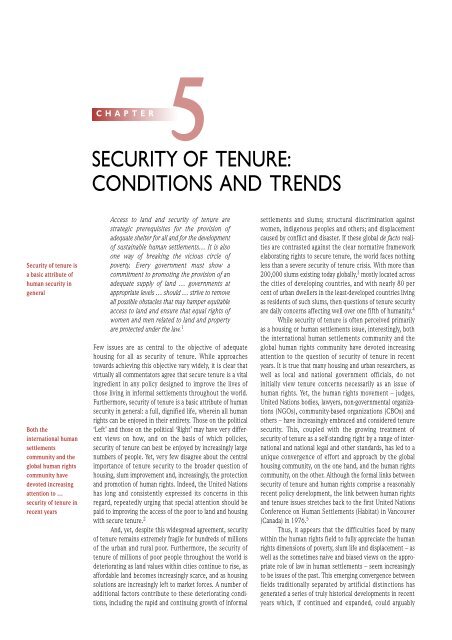Global Report on Human Settlements 2007 - PoA-ISS
Global Report on Human Settlements 2007 - PoA-ISS
Global Report on Human Settlements 2007 - PoA-ISS
Create successful ePaper yourself
Turn your PDF publications into a flip-book with our unique Google optimized e-Paper software.
5<br />
CHAPTER<br />
SECURITY OF TENURE:<br />
CONDITIONS AND TRENDS<br />
Security of tenure is<br />
a basic attribute of<br />
human security in<br />
general<br />
Both the<br />
internati<strong>on</strong>al human<br />
settlements<br />
community and the<br />
global human rights<br />
community have<br />
devoted increasing<br />
attenti<strong>on</strong> to …<br />
security of tenure in<br />
recent years<br />
Access to land and security of tenure are<br />
strategic prerequisites for the provisi<strong>on</strong> of<br />
adequate shelter for all and for the development<br />
of sustainable human settlements… It is also<br />
<strong>on</strong>e way of breaking the vicious circle of<br />
poverty. Every government must show a<br />
commitment to promoting the provisi<strong>on</strong> of an<br />
adequate supply of land … governments at<br />
appropriate levels … should … strive to remove<br />
all possible obstacles that may hamper equitable<br />
access to land and ensure that equal rights of<br />
women and men related to land and property<br />
are protected under the law. 1<br />
Few issues are as central to the objective of adequate<br />
housing for all as security of tenure. While approaches<br />
towards achieving this objective vary widely, it is clear that<br />
virtually all commentators agree that secure tenure is a vital<br />
ingredient in any policy designed to improve the lives of<br />
those living in informal settlements throughout the world.<br />
Furthermore, security of tenure is a basic attribute of human<br />
security in general: a full, dignified life, wherein all human<br />
rights can be enjoyed in their entirety. Those <strong>on</strong> the political<br />
‘Left’ and those <strong>on</strong> the political ‘Right’ may have very different<br />
views <strong>on</strong> how, and <strong>on</strong> the basis of which policies,<br />
security of tenure can best be enjoyed by increasingly large<br />
numbers of people. Yet, very few disagree about the central<br />
importance of tenure security to the broader questi<strong>on</strong> of<br />
housing, slum improvement and, increasingly, the protecti<strong>on</strong><br />
and promoti<strong>on</strong> of human rights. Indeed, the United Nati<strong>on</strong>s<br />
has l<strong>on</strong>g and c<strong>on</strong>sistently expressed its c<strong>on</strong>cerns in this<br />
regard, repeatedly urging that special attenti<strong>on</strong> should be<br />
paid to improving the access of the poor to land and housing<br />
with secure tenure. 2<br />
And, yet, despite this widespread agreement, security<br />
of tenure remains extremely fragile for hundreds of milli<strong>on</strong>s<br />
of the urban and rural poor. Furthermore, the security of<br />
tenure of milli<strong>on</strong>s of poor people throughout the world is<br />
deteriorating as land values within cities c<strong>on</strong>tinue to rise, as<br />
affordable land becomes increasingly scarce, and as housing<br />
soluti<strong>on</strong>s are increasingly left to market forces. A number of<br />
additi<strong>on</strong>al factors c<strong>on</strong>tribute to these deteriorating c<strong>on</strong>diti<strong>on</strong>s,<br />
including the rapid and c<strong>on</strong>tinuing growth of informal<br />
settlements and slums; structural discriminati<strong>on</strong> against<br />
women, indigenous peoples and others; and displacement<br />
caused by c<strong>on</strong>flict and disaster. If these global de facto realities<br />
are c<strong>on</strong>trasted against the clear normative framework<br />
elaborating rights to secure tenure, the world faces nothing<br />
less than a severe security of tenure crisis. With more than<br />
200,000 slums existing today globally, 3 mostly located across<br />
the cities of developing countries, and with nearly 80 per<br />
cent of urban dwellers in the least-developed countries living<br />
as residents of such slums, then questi<strong>on</strong>s of tenure security<br />
are daily c<strong>on</strong>cerns affecting well over <strong>on</strong>e fifth of humanity. 4<br />
While security of tenure is often perceived primarily<br />
as a housing or human settlements issue, interestingly, both<br />
the internati<strong>on</strong>al human settlements community and the<br />
global human rights community have devoted increasing<br />
attenti<strong>on</strong> to the questi<strong>on</strong> of security of tenure in recent<br />
years. It is true that many housing and urban researchers, as<br />
well as local and nati<strong>on</strong>al government officials, do not<br />
initially view tenure c<strong>on</strong>cerns necessarily as an issue of<br />
human rights. Yet, the human rights movement – judges,<br />
United Nati<strong>on</strong>s bodies, lawyers, n<strong>on</strong>-governmental organizati<strong>on</strong>s<br />
(NGOs), community-based organizati<strong>on</strong>s (CBOs) and<br />
others – have increasingly embraced and c<strong>on</strong>sidered tenure<br />
security. This, coupled with the growing treatment of<br />
security of tenure as a self-standing right by a range of internati<strong>on</strong>al<br />
and nati<strong>on</strong>al legal and other standards, has led to a<br />
unique c<strong>on</strong>vergence of effort and approach by the global<br />
housing community, <strong>on</strong> the <strong>on</strong>e hand, and the human rights<br />
community, <strong>on</strong> the other. Although the formal links between<br />
security of tenure and human rights comprise a reas<strong>on</strong>ably<br />
recent policy development, the link between human rights<br />
and tenure issues stretches back to the first United Nati<strong>on</strong>s<br />
C<strong>on</strong>ference <strong>on</strong> <strong>Human</strong> <strong>Settlements</strong> (Habitat) in Vancouver<br />
(Canada) in 1976. 5<br />
Thus, it appears that the difficulties faced by many<br />
within the human rights field to fully appreciate the human<br />
rights dimensi<strong>on</strong>s of poverty, slum life and displacement – as<br />
well as the sometimes naive and biased views <strong>on</strong> the appropriate<br />
role of law in human settlements – seem increasingly<br />
to be issues of the past. This emerging c<strong>on</strong>vergence between<br />
fields traditi<strong>on</strong>ally separated by artificial distincti<strong>on</strong>s has<br />
generated a series of truly historical developments in recent<br />
years which, if c<strong>on</strong>tinued and expanded, could arguably

















